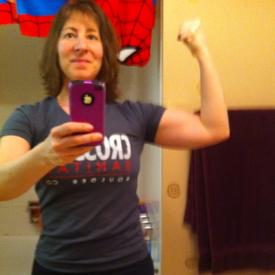Is grass-fed beef really more lean? Nutritional data?

Doberdawn
Posts: 733 Member
I was at a farmers market recently. One of the vendors told me his grass-fed organic ground chuck meat was actually a lot leaner than the meats I would buy in the store. However, he could not give me any fat percentages or other nutritional data. Does anyone know if this is true, that a pure grazing grass fed stock animal will produce leaner meat? Does anyone have nutritional data for grass fed ground chuck or other meats?
0
Replies
-
My understanding is that grass-fed organic beef is generally healthier, but it may or may not be leaner than what you'll find in a store. I buy 96/4 beef from Trader Joe's and would be hard pressed to find anything leaner.0
-
Grass fed beef generally has lower total fat content but that doesn't arbitrarily make it healthier as they (grass vs grain fed) have different fatty acid profiles.
http://www.nutritionj.com/content/9/1/10
^ This study will make it seem like grass fed beef is always better. Alan Aragon does a great job analyzing this and another study to point out why this isn't necessarily a black and white thing, but it wouldn't be right for me to post his work here. It's the most recent issue of AARR, first page.0 -
Don't have specific data, but from personal experience it does seem to be leaner. For example, to me a conventional ribeye is too fatty but grass fed is not, and game such as moose is even leaner yet. Conventionally raised beef are fed grains to fatten them up and give the meat marbelling aka fat/flavor.0
-
Perhaps the most benefit is the fatty acid profile.0
-
I couldn't tell you about the nutritional differences, but the taste is definitely better!0
-
I just got my steer back from the butcher, I would not claim those cuts to be leaner than store meat. He was lowline angus (known for their ability to 'finish' on grass alone) and he had excellent fat marbling, just on grass. Your average commercial angus (larger animal) will not put on much fat on grass. Most butchered beef is fed a lot of grain 6 weeks until butcher, and those grains can have a lot of chemicals in them. Try a piece, a lot of people can't stand the taste difference of grass fed.0
-
I raised lean pigs this year and they are a bit tough compared to the crate-raised commercial pigs. They ran, they ate pasture, and when the meat came out to be $4 a pound butchered people got all bent out of shape over it. -- Grass fed beef generally is tougher.. depends a LOT on the butcher though.. if it is aged long it's much softer. Have you ever driven past a beef feed lot? It's the most horrible smell ever. It has to take the health of the animal, and their meat, down a few notches.0
-
I know this is insane, but as a English country girl born and bred I had NO idea that there are cows NOT fed grass, wow, what sort of a messed up thing is that? All the cows here live in fields and eat grass.0
-
I know this is insane, but as a English country girl born and bred I had NO idea that there are cows NOT fed grass, wow, what sort of a messed up thing is that? All the cows here live in fields and eat grass.
Like she said, cows don't naturally eat grains. They eat grass. At the risk of sounding like a conspiracy theorist, cows raised by big industrial farms are fed grain because it's cheap due to all the subsidies. I don't eat red meat, but I would imagine a grass fed cow is a happier cow and I like my animal meat to come from happy animals. It makes me feel less like less of a jerk for eating them.0 -
Sure like that lean ribeye.0
-
Most grassfed beef is leaner than conventionally finished beef, but it doesn't have to be. Leanness, particularly in grass finishing, is a function of breed and management. It's hard for a small producer to accurately provide the fat percentages since they would have to test each animal. Plus there are some seasonal variations in the fatty acid profile. The USDA National Nutrient Database for Standard Reference (http://ndb.nal.usda.gov/) is a good starting point for nutritional information.0
-
I was at a farmers market recently. One of the vendors told me his grass-fed organic ground chuck meat was actually a lot leaner than the meats I would buy in the store. However, he could not give me any fat percentages or other nutritional data. Does anyone know if this is true, that a pure grazing grass fed stock animal will produce leaner meat? Does anyone have nutritional data for grass fed ground chuck or other meats?
Grass fed beef generally has less marbling than non grass feed beef, which is not a good thing imo0 -
Beef from large industrial farms generally receive hormones, antibiotics, eat pesticide-laden grass and finish on corn which changes their fatty acid profile. Even the stress of being pushed through the slaughtering line can change the nutrient profile for the worse as the animal emits stress hormones that affect the muscle meat that you end up eating. All of the nasty stuff will reside largely in the fat. If you eat that beef, it's a good idea to trim the fat and get a lean cut. If you buy grass-fed/grass-finished beef at the Farmer's market that was raised on an organic farm, you can enjoy that fatty goodness. Plus you can feel happy that you are supporting a local farmer. And you can ask where the animal was butchered and find out their methods. My butcher is very careful about leading each animal quietly in to keep it calm, and beef from each farm is processed on different days and carefully separated while drying so they can ensure you are getting the animal you are paying for.
I don't know the exact leanness of my ground beef, but it definitely puts out less grease than regular ground beef, to the point that I often have very little to drain out. My brisket had lots of fat. My flank steak had almost none. I have yet to make any real steak cuts yet from my cow, but some cuts seem to have more marbling than others.
Generally, you should cook grass-fed beef slower than corn-finished since it's generally leaner and can be tougher.0 -
from what I understand, the grass fed beef contains a bunch more omega 3 fatty acids than grain-fed.
Grain fed cows gain like a third more weight over their life span than grass fed.
Grass fed cows are paleo and gluten free. They're the trendy diet snobs of cows.0 -
from what I understand, the grass fed beef contains a bunch more omega 3 fatty acids than grain-fed.
slightly more0 -
Sure like that lean ribeye.
ha0 -
Generally, grass fed are leaner because they have to "work" more to get their food. They walk lots more than grain fed because they're kept on very large ranches, whereas grain fed are usually kept on smaller farms or commercial farms with tons of other cows. It only makes sense that they grass fed cows would be leaner.
In my opinion, the grain fed ones taste waaaaay better, but it's just a personal preference.0 -
We are eating hamburger now out of young cows that were pastured but also grain fed. I'll tell you this stuff is a lot leaner than the hamburger I would buy at the store, normal ground beef or chuck. The butcher said it was comparable to 93/7 beef you would buy at the store. I believe it. When I brown the burger up, the amount of grease I have left is very minimal and it is more like water than grease.
When I log in the ground beef I use, I do log it in as 90/10 just because I am not totally sure what the fat content is but I feel that is a good middle ground.0 -
Grass fed beef generally has lower total fat content but that doesn't arbitrarily make it healthier as they (grass vs grain fed) have different fatty acid profiles.
http://www.nutritionj.com/content/9/1/10
^ This study will make it seem like grass fed beef is always better. Alan Aragon does a great job analyzing this and another study to point out why this isn't necessarily a black and white thing, but it wouldn't be right for me to post his work here. It's the most recent issue of AARR, first page.
Thanks for the article. I would go read Alan Aragon's work, but I don't know what AARR stands for. Can you please provide?0 -
The short answer is it depends. The long answer is that grass fed cattle have a different fat makeup that can most easily be seen by looking at the fat. Grass fed will have a more yellow cast than the pure white of grain fed. Since grains really mess up the stomach acids of cattle and other ruminants, you get more cases of highly resistant e.coli in grain fed cattle.
It is possible to get a very good USDA Prime carcass from a grass fed beef, but it is much more difficult and takes time and very good grazing usually on a serries of annual plants instead of just plain perinial grass. Since this is harder to do and takes at least 24 to 36 months most grassfed beef ends up being much leaner than the 15 month grain/candy fattened beef from the feed lots.
Ground beef is even more varriable because it depends on how the butcher prepares it. If it is from cuts that normally go into steaks and roasts then it will be pretty lean. Also most commercial ground beef has had extra fat added to the meat so it stays barely above the 70% lean mark. Many sellers of grass fed beef will work with the processors to produce 80% - 90% lean beef. We usually have ours done at about 93% lean, but have had one this year that was about 80% and another that was about 97%. You need to know how to work with the higher percentage lean grinds though. They work great in stir frys and pasta sauces but are not so good for burgers.0
This discussion has been closed.
Categories
- All Categories
- 1.4M Health, Wellness and Goals
- 398.1K Introduce Yourself
- 44.7K Getting Started
- 261K Health and Weight Loss
- 176.4K Food and Nutrition
- 47.7K Recipes
- 233K Fitness and Exercise
- 462 Sleep, Mindfulness and Overall Wellness
- 6.5K Goal: Maintaining Weight
- 8.7K Goal: Gaining Weight and Body Building
- 153.5K Motivation and Support
- 8.4K Challenges
- 1.4K Debate Club
- 96.5K Chit-Chat
- 2.6K Fun and Games
- 4.8K MyFitnessPal Information
- 12 News and Announcements
- 21 MyFitnessPal Academy
- 1.5K Feature Suggestions and Ideas
- 3.2K MyFitnessPal Tech Support Questions













